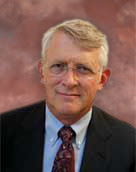My ongoing transition from corporate VP to self-employment is posing several challenges, including the need to design a new business card. I decided to list three functional roles after my name rather than an executive title -- generating the next three blog posts because each function deserves an explanation. My primary professional self-identity is being a health futurist, so just what does that mean?
Ever since serving as the Colorado Governor's health policy adviser back in the 1980s, I've purposefully analyzed the five trends that I believe are most likely to shape health care delivery over two to five years. I decided to follow only the top five trends because they account for at least 80% of the changes that ultimately occur, and organizations and their leaders rarely have the capacity to deal with more than a handful of challenges at a time. I selected the 2-5 year horizon because it's the time frame within which strategic decisions can be made and implemented. It gives a sense of immediacy for actions that need to be taken while outcomes can still be influenced. (Whether organizations actually take timely steps to shape their futures is a separate challenge that I generally leave to colleagues with expertise in organizational change.)
I also believe a health futurist should forecast the future, not predict it. Predictions are statements of what will happen and when, such as health care spending will hit 20% of GDP in 2015. Predictions assume continuation of trends that shaped the future in the past -- an absurdity in today's uncertain world because health care is being transformed by a revolution in clinical knowledge, unprecedented progress in communications and information technologies, and dramatic redistribution of financial responsibility in the medical marketplace.
Forecasts are estimates of the probabilities of possibilities, such as the likelihood that health care spending as a % of GDP in 2015 will be more, the same, or less than it is now. (My current forecast for these possibilities is 20%, 60%, and 20%.) The health futurist as forecaster is responsible for identifying the circumstances that could lead to each possibility and recommending interventions that could reasonably be expected to increase the probability of desired outcomes.
To me, being a health futurist is fun when motivated by a strong belief that progress can come from creative, purposeful responses to anticipated changes. Forecast-based futurism sure beats the alternative of trying to cope with rigid, prediction-driven "reforms" like HITECH and PPACA. I think we in the business can do better than the politicians, which is why my role as a health futurist is pondering the realm of the possible and suggesting options to create a variety of really good medical systems. How do you approach the future of health care? Are you having fun yet?
Tuesday, February 8, 2011 | Posted by Jeffrey C. (Jeff) Bauer at 1:00 PM |
What is a health futurist?
Subscribe to:
Post Comments (Atom)


0 comments:
Post a Comment